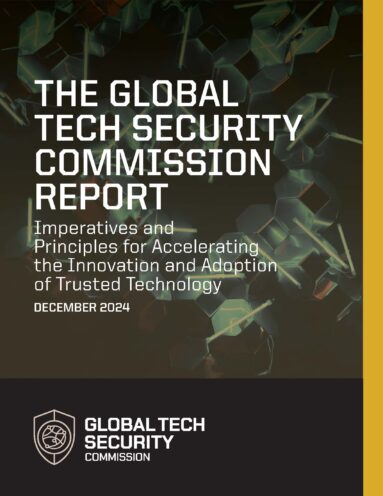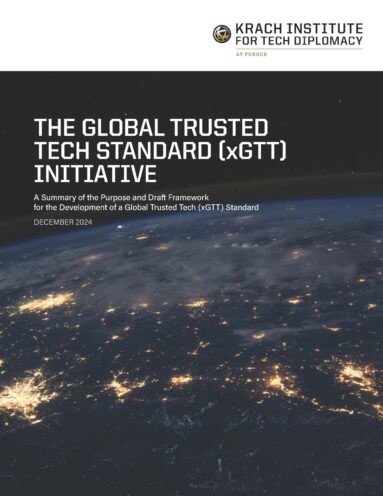Findings and Five Imperatives
“When considering the defense of a nation, the military is no longer the sole agent, nor are its kinetic capabilities the last word in foreign relations.”
—David Stilwell, Global Tech Security Commissioner for Defense, May 2023
Thoroughly understanding the nuances of either geopolitics or technology is a full-time pursuit. To understand how each one affects the other makes the task more daunting. Even as diplomatic, tech, business, and civil society leaders strive to ensure that technology advances freedom, deciding the priority battlegrounds of effort can be overwhelming even for experts. That is why the Global Tech Security Commission identified five high-leverage areas in which the Global Trusted Tech Network can dramatically accelerate the innovation and adoption of trusted technology—provided that we take action in the next one to five years.
Imperative #1: Education and R&D

In the course of its analysis, the Commission recognized that public and private sector leaders consistently lack refined understandings of how emerging technologies work, their place in the broader tech ecosystem, and their role in influencing geopolitical dynamics. The world’s most powerful people—and decision-makers at all levels— need trusted and comprehensive information on the topics that will shape the future of geopolitics. Without it, they will be in the dark as they attempt to make good decisions, develop their workforces, and position their nations for economic success. As a result, the Commission identified several critical lines of effort for building knowledge and technical capacity on emerging technologies and their implications:
Bolstering tech diplomacy proficiency: The hyper speed and scale of tech innovation is daunting, not to mention the specialized knowledge required to understand even the basics of large language models, quantum physics, 6G wireless networks, satellite communications, semiconductor microelectronics, and synthetic biology. The complications inherent in understanding these technologies and others is compounded by the intricacies of the export control policies, global data regulations, industrial policies, and regulatory policies that govern the creation and proliferation of tech. Thus, most diplomats and business leaders do not yet fully understand the technologies themselves, their grand implications for today’s 4D geopolitical competition, and the role these leaders can and must play in ensuring that technology advances freedom.
In September 2022, scholars from the Special Competitive Studies Project recommended that the U.S. State Department “increase training, build STEM policy literacy, and create more tech officer positions in the Department of State.”[21] Similarly, the October 2023 issue of the Stanford Emerging Technology Review encouraged, “Policymakers need better expert resources to help them more easily understand the burgeoning and complex array of technological developments—more easily and more continuously.”[22] The Krach Institute for Tech Diplomacy at Purdue has already responded to this call by standing up the world’s first Tech Diplomacy Academy. It is our intent that the Tech Diplomacy Academy will scale worldwide and help catalyze business, government and citizen leaders to educate their teams, students, and employees to shape the trajectory of trusted technology.
Turbo-charging STEM talent: Free nations must also develop a workforce capable of seizing the commanding heights of future innovation. It is imperative that free nations continue to train citizens with high STEM competencies essential to high-level R&D. Data from the 2022 Program for International Student Assessment revealed that U.S. students ranked a dismal 28th out of 37 countries in math and 12th out of 37 in science.[23] In Europe, 30% of 15-yearold EU students are non-proficient in mathematics, and 25% fail to achieve proficiency in science.[24]

Tech Diplomacy Academy
To meet the challenge of training a new generation of Tech Diplomats, the Krach Institute for Tech Diplomacy at Purdue founded and launched the Tech Diplomacy Academy in 2024 to provide a comprehensive understanding of emerging and critical technologies and their impact on commerce, national security, and foreign policy. It is the world’s first and only online education platform training government, business, technology, and citizen leaders at scale about critical and emerging technologies and their role in the contest between freedom and authoritarianism. Tech Diplomacy Academy launch partners and early adopters include the U.S. State Department, U.S. Commerce Department, U.S. Navy Foreign Affairs Officers, the Australian Strategic Policy Institute, the Black Sea Trust of the German Marshall Fund, Edge A.I., global consulting firms Deloitte and Guidehouse, the U.S.-Taiwan Business Council, and National Chengchi University (NCCU) and National Yang Ming Chiao Tung University (NYCU) in Taiwan.
While the U.S. and other free nations are blessed to have many high-achieving immigrants graduate their institutions, most of whom go on to add value to tech companies, unpredictable immigration policies and the intensification of global tech competition call for greater K-12 and college-level achievement in STEM disciplines. The time is now to invest in this strategic asset.
Using Higher Education as a Strategic Asset: Finally, higher education must be viewed as a strategic asset in tech competition. The nations that can produce the greatest number and most talented high-level STEM graduates will have an advantage in leading every aspect of the tech innovation race.
[21] “Remaking U.S. Global Leadership in the Age of Technology Competition,” In Remaking U.S. Global Leadership in the Age of Technology Competition, Special Competitive Studies Project, September 2022, https://www.scsp.ai/reports/mid-decade-challenges-for-national-competitiveness/chapter-4/
[22] The Stanford Emerging Technology Review, October 2023, p. 10, https://setr.stanford.edu/sites/default/files/2023-11/SETR_web_231120.pdf
[23] Brian Kennedy, “Most Americans Think U.S. K-12 STEM Education Isn’t above Average, but Test Results Paint a Mixed Picture,” Pew Research Center, April 24, 2024, https://www.pewresearch.org/short-reads/2024/04/24/most-americans-think-us-k-12-stem-education-isnt-above-average-but-test-results-paint-a-mixed-picture/
[24] “Report of PISA 2022 study outlines worsening educational performance and deeper inequality,” The European Commission, February 12, 2004, https://education.ec.europa.eu/news/report-of-pisa-2022-study-outlines-worsening-educational-performance-and-deeper-inequality#:~:text=30%25%20of%20EU%20students%20don,background%20are%20underachieving%20in%20mathematics
Imperative #2: Technology and International Standards

Whether railroad track gauges in 19th century America, the battle between VHS or Beta home video formats in the 1980s, or electric vehicle charging configurations today, standardization has helped guide the secure adoption (or decline) of certain technologies. When companies, governments, or international bodies have the power to set technological standards, they have the power to shape how technologies are deployed and adopted. The Commission realized that in our globalized era, the often-universal nature of standards makes them among the most powerful tools for protecting freedom, security and innovation. Therefore, it is recommended that the establishment of trusted technology standards must be one of the Global Trusted Tech Network’s highest priorities.
“The Tech Diplomacy Academy will play a vital role ensuring that our leaders across the NATO Alliance and beyond understand the technologies, business strategies and diplomatic tools that must be employed to secure our continuing leadership in vital tech sectors now and in the next generation.”
Mircea Geoana, NATO Deputy Secretary General, 2019-2024, May 2024[41]
Governments and tech companies alike thus have an interest in defending emerging tech regulations and standards that spur their own business successes and national prosperity. It is obvious to state the risks presented by authoritarian states that don’t respect human rights, transparency, privacy, or laws to set global technical standards that favor their companies and countries, and disregard freedom. Unfortunately, private sector companies have not to date advocated aggressively enough before international standard setting bodies. It is time for them to advocate for the foundational freedoms that make these companies prosperous in the first place.
Lack of engagement has opened the door for China and Russia to try and rewrite the rules of the digital road. In 2011, the Shanghai Cooperative Organization—a grouping of Eurasian nations including China and Russia, submitted to the UN Secretary General an International Code of Conduct for Information Security which, according to Kristen Eichensehr of Just Security, “seemed to deny the applicability of existing international law to cyberspace, advocated increased government control over the Internet, and legitimized limitations on freedom of expression.”[25] More recently, China’s 2021 five-year plan openly called for “promoting advantageous and special Chinese technology standards to become international standards to serve Chinese enterprises and industry going global.”[26]
The China Standards 2035 initiative also envisions a greater role for Chinese tech companies in shaping international tech standards—and China has already made headway in setting three internationally-recognized 6G standards under the jurisdiction of the International Telecommunications Union (ITU).[27] Beijing has also vigorously lobbied the ITU to create rules that favor its own tech companies and enable greater online censorship. China has pushed a plan called the New IP—which also enjoys Russian support—which essentially seeks to give governments more power to control a user’s internet access and track his or her online activity.[28]
“With the growth of the Internet has come an evolution in the connectedness of people across the globe. This has led to policy and governance issues that require understanding of the norms and principles of free nations as well as the technology that influences them today.”
Rob Spalding, Global Tech Security Commissioner for 5G/6G, May 2023
Fortunately, the U.S. and its allies scored a win for tech freedom when American Doreen Bogdan-Martin won the ITU’s October 2022 leadership election over Russian candidate Rashid Ismailov—an ally of Beijing’s efforts. Similarly, in 2020, U.S. diplomats worked to defeat a China-supported candidate and elect Singaporean Daren Tang as the head of the UN’s World Intellectual Property Organization—a global body with power to define norms surrounding intellectual property protection.[29] These successful diplomatic efforts to protect tech security and freedom—to include voices from the private sector—should be replicated whenever elections for personnel leading international standard-setting bodies are held. Standard-setting also presents a golden opportunity for private sector and public sector leaders to work together to set tech standards that will reinforce the leadership of free-world companies and international security objectives.
[25] Kristen Eichensehr, “International Cyber Governance: Engagement Without Agreement?,” Just Security, February 2, 2015, https://www.justsecurity.org/19599/international-cyber-governance-engagement-agreement/
[26] “China in International Standards Setting: USCBC Recommendations for Constructive Participation,” The US-China Business Council, February 2020, https://www.uschina.org/sites/default/files/china_in_international_standards_setting.pdf
[27] Zhang Tong, “China Sets Some Global Standards for 6G Tech as It Looks towards Next-Gen Communications,” South China Morning Post, September 13, 2024, https://www.scmp.com/news/china/science/article/3278257/china-sets-some-global-standards-6g-tech-it-looks-towards-next-gen-communications
[28] Mark Montgomery and Theo Lebryk, “China’s Dystopian ‘New IP’ Plan Shows Need for Renewed US Commitment to Internet Governance,” Just Security, April 13, 2021, https://www.justsecurity.org/75741/chinas-dystopian-new-ip-plan-shows-need-for-renewed-us-commitment-to-internet-governance/
[29] Nick Cumming-Bruce, “U.S.-Backed Candidate for Global Tech Post Beats China’s Nominee,” The New York Times, March 4, 2020, sec. Business, https://www.nytimes.com/2020/03/04/business/economy/un-world-intellectual-property-organization.html
[41] Krach Institute Unveils World’s First Tech Diplomacy Academy, Pioneering a New Era of Global Leadership,” Krach Institute for Tech Diplomacy, April 30, 2024, https://techdiplomacy.org/news/krach-institute-unveils-tech-diplomacy-academy/
Imperative #3: Technology Supply Chains and Infrastructure

The production of modern technologies depends on components and minerals sourced from various corners of the globe, whether rare earth materials, solar cells, semiconductor components, pharmaceutical ingredients, and more. Thus, reliable, resilient, and secure supply chains are at the core of all critical tech sectors—and all global economic trade and prosperity. If authoritarian nations can control the source materials or foundational components of critical technologies, the world will be at their mercy for what it needs. Accordingly, the Commission decided that securing the building blocks of the modern economy—supply chains and infrastructure—must be a foundational priority area.
The consequences of Russia’s 2022 invasion of Ukraine have underscored the importance of eradicating supply chain vulnerabilities. Russian aggression has prompted European governments to substantially cut themselves off from Russian energy supplies, leaving them scrambling to find alternative sources of oil and gas. Instead of viewing energy trade with Europe as a pillar of economic interdependence that deterred conflict, the Russian government was willing to count the loss of billions of dollars in energy sales and the NordStream 2 pipeline as an acceptable casualty in its foreign policy goal of obliterating Ukraine’s sovereignty and national identity. European governments have since wrestled with high prices and shortages of energy that depress economic growth.
Just as dramatically, shortages of medical supplies, computer chips and consumer goods during the COVID-19 pandemic likewise exposed the dangers of depending on authoritarian regimes for key products. The possibility of China cutting off supplies of tech exports (and their key components) as a form of economic warfare is based on recent examples:
THE GLOBAL TRUSTED TECH (XGTT) STANDARD INITIATIVE: DEFINING TRUSTED TECHNOLOGY
There is a clear need for an overarching technical standard that defines trusted technology, which is why the Krach Institute for Tech Diplomacy at Purdue has initiated the first-of-its-kind Global Trusted Tech (xGTT) Standard Initiative.
Based on the success of the Trust Standard at the heart of the Clean Network to Secure 5G, the xGTT Standard aims to develop and implement a global standard for trusted technology and a process by which the standard is adopted, trusted technology is validated, and entities are labeled as purveyors of trusted tech. It will enable frictionless collaboration between governments, companies, and other organizations around trusted technologies. The xGTT Initiative is led by a world-class governance structure, with a Board of Governors and Co-Chair—Taiwan’s Cyber Ambassador-at-Large and former Minister of Digital Affairs, Audrey Tang—to develop, shape and promulgate the xGTT Standard around the globe.
- In 2010, China restricted exports of rare earth minerals to Japan after Japan detained a Chinese fisherman who ran into Japanese coast guard boats in disputed waters.[30]
- In 2020, China placed import duties or restrictions on Australian products such as barley, cotton, coal, timber and wine after the Australian government demanded answers on the origin of the COVID-19 pandemic.[31]
- In 2023, China imposed curbs on exports of gallium and germanium (used in the world’s semiconductors) and graphite (used in the world’s EV batteries). China produces 90% of the word’s gallium and 60% of germanium and refines more than 90 percent of global graphite.[32]
While the world’s focus on cybersecurity has often appropriately centered on software or 5G networks, the potential to create “Trojan Horse” vulnerabilities in the world’s tech hardware products has been sorely neglected. Imagine circuit boards or power supply chips embedded with a “kill switch” that could be remotely activated in a crisis. It is not fantasy. In 2018, Bloomberg reported on how Chinese operatives surreptitiously inserted unauthorized chips onto Super Micro circuit boards that created opportunities for malware insertion into corporate and Pentagon servers.[33]
Trusted technology demands secure supply chains and infrastructure. Companies must reconfigure these value chains, manufacturing practices and supporting logistics systems toward maximum transparency, reliability and fair labor standards. The U.S. and its partners must develop alternatives to incentivize companies to keep production in, or return it to, the U.S. or trusted tech partner nations. A key part of this is addressing regulatory environments, tax structures and permitting systems to make it easier and more profitable to locate manufacturing in these countries, rather than in China or other authoritarian states. This extends to energy supplies and transportation networks without which companies cannot survive, much less thrive.
[30] Keith Bradsher, “Amid Tension, China Blocks Vital Exports to Japan,” The New York Times, September 23, 2010, sec. Business, https://www.nytimes.com/2010/09/23/business/global/23rare.html
[31] Saheli Roy Choudhury, “Here’s a List of the Australian Exports Hit by Restrictions in China,” CNBC, December 18, 2020, https://www.cnbc.com/2020/12/18/australia-china-trade-disputes-in-2020.html
[32] Emily Benson and Thibault Denamiel, “China’s New Graphite Restrictions,” Center for Strategic and International Studies, October 23, 2023, https://www.csis.org/analysis/chinas-new-graphite-restrictions
[33] Jordan Robertson and Michael Riley, “The Long Hack: How China Exploited a U.S. Tech Supplier,” Bloomberg, February 12, 2021, https://www.bloomberg.com/features/2021-supermicro/
Imperative #4: Capital Markets and the Funding of Emerging Tech

Investments are the lifeblood of capitalism. Money builds firms up; lack of it forces them to close. Free nations prosper when their visionary companies can raise funding in open markets and outpace tech developers in authoritarian countries. But global capital markets can also contribute to the growth and development of authoritarian nations’ tech sector, and China especially has already exploited the free world’s open system to bankroll its way to tech dominance. The Commission sees highest-order strategic value in establishing “trusted capital markets”—investment climates in which investors do not fund innovations that can later be weaponized against them, their nations, and their freedoms.
“Fundamental and foundational to a winning global tech security strategy is the establishment of a trusted, transparent, and secure global supply chain network whose participants are all aligned against the key values of freedom and democracy and are dedicated to the development of the trusted relationships that make it all work.”
Jim Schwab, Global Tech Security Commissioner for Supply Chains, May 2023
Approximately 5,000 Chinese companies are listed on U.S. securities exchanges, giving them access to hard currency financing and income. American investors supplied as much as $3 trillion of capital to Chinese companies from 2013-2023, much of it buried in passive investment vehicles like bonds and index funds.[34] As then-Under Secretary Krach stated in a letter to U.S. universities in 2020, “the majority of the U.S. university endowment fund portfolios own PRC stocks listed on American exchanges either directly or indirectly through emerging markets index funds.”[35]
Listings on U.S. exchanges give “China, Inc.” companies an American “seal of approval” that gives other global exchanges confidence to list Chinese companies. But letting “China, Inc.” list as publicly traded companies sends the wrong signal to the world. Chinese companies are infamous for stealing technology, using it to compete against the U.S. and its partners and allies in the free world, and then putting their competitors out of business. Many Chinese companies are also complicit in human rights violations or render services to the Chinese security state. In January 2021, Under Secretary Krach listed 44 parent corporations and more than 1,100 subsidiary companies as Communist Chinese Military Companies from which American investors by law must now divest.[36] But there are undoubtedly many other unidentified Chinese companies traded publicly with opaque ties to the Chinese Communist Party and the People’s Liberation Army. Not to be outdone, Iran has also exploited cryptocurrency exchanges to skirt sanctions. In 2022, Reuters reported that Binance allowed Iranian firms to trade approximately $8 billion in crypto, largely using a token with an anonymity option.[37]
Furthermore, American capital funding Chinese tech firms creates financial incentives for free world business and finance leaders to lobby their governments against accountability, transparency, and sanctions on China and Chinese companies. In this way, China has captured global financial elites. Reforming capital markets to prevent adversary nations from strengthening their techno-military power ensures that financial industry leaders, wealth managers, and investment advisors fulfill their moral obligation and fiduciary duty to protect U.S. investors.
TECH COMPANIES SEEING FEWER ADVANTAGES TO DOING BUSINESS IN CHINA
China’s “Delete A(merica)” and Made in China 2025 initiatives are designed to put firms from the U.S., Europe and Asia out of business in China and elsewhere. Recognizing the decreased profitability, greater risks to intellectual property and increasing physical danger to personnel associated with operating in China, more business leaders are moving operations from China to trusted allied partners. Here are just a few tech companies that have scaled back operations in China in the last few years:
- Apple
- Blizzard Entertainment
- Dell
- IBM
- LG
- Microsoft/LinkedIn
- Nintendo
- Samsung[42]
There are additional problems with public listings of Chinese companies beyond the risk of investors funding a buildup of Chinese national security capabilities. Approximately 95% of Chinese companies listed on the New York Stock Exchange and Nasdaq are structured as Variable Interest Entities (VIEs), shell company substitutes domiciled in offshore locations.[38] This sleight of hand, wherein investors do not own actual Chinese shareholdings, deprives investors of adequate legal protections and minority shareholder rights.
Chinese firms also do not adhere to free world standards of rule of law, risk disclosure, or corporate governance, making them riskier investments than they may seem on the surface. They’ve managed to get around the financial transparency laws required of companies in the U.S., Europe and elsewhere to enjoy capital market listings.
In the geopolitical competition for the commanding heights of emerging technologies, free world investors should not be funding untrusted technological developments for our adversaries or their militaries. What the world needs is “trusted investments” in its capital markets, pension funds, university endowments, foundations, mutual funds and bond portfolios.
“In my view, it is not possible to identify a strategic-level, financial scandal of anywhere near this scale in modern history, whereby a democracy (notably, our own) has engaged in the multi-trillion-dollar underwriting of an authoritarian police state (read: China) bent on undermining our values and way of life, aided and abetted by some fiduciarily malfeasant Wall Street firms and other fund managers, and certain conflicted U.S. government regulators at the top levels of the Treasury Department, the SEC and the National Economic Council.”
Roger Robinson, Global Tech Security Commissioner for Capital Markets, Former Chairman of the U.S.-China Economic and Security Review Commission, Testimony before the U.S. House of Representatives China Select Committee, May 17, 2023[43]
[34] Roger W. Robinson Jr., “Leveling the Playing Field: How to Counter the CCP’s Economic Aggression,” Statement Before the U.S. House of Representatives Select Committee on the Strategic Competition Between the United States and the Chinese Communist Party, May 17, 2023, p. 17, https://docs.house.gov/meetings/ZS/ZS00/20230517/115974/HHRG-118-ZS00-Wstate-RobinsonR-20230517.pdf
[35] Under Secretary of State Keith Krach, Letter to the Governing Boards of American Universities, August 18, 2020, https://2017-2021.state.gov/letter-from-under-secretary-keith-krach-to-the-governing-boards-of-american-universities/
[36] “Communist Chinese Military Companies Listed Under E.O. 13959 Have More Than 1,100 Subsidiaries,” U.S. Department of State, January 14, 2021, https://2017-2021.state.gov/communist-chinese-military-companies-listed-under-e-o-13959-have-more-than-1100-subsidiaries/
[37] Angus Berwick and Tom Wilson, “Crypto exchange Binance helped Iranian firms trade $8 billion despite sanctions,” Reuters, November 7, 2022, https://www.reuters.com/business/finance/exclusive-crypto-exchange-binance-helped-iranian-firms-trade-8-billion-despite-2022-11-04/
[38] Robinson, “Leveling the Playing Field,” p. 8
[42] Alice Cattley, “Why These 27 Western Brands Are Abandoning China,” Yahoo Finance, March 1, 2024, https://uk.finance.yahoo.com/news/why-27-western-brands-abandoning-170200239.html
[43] Robinson, “Leveling the Playing Field,” p. 11
Imperative #5: Board Governance and Its Role in Trusted Tech

In the course of its work, the Commission recognized a dramatic problem: Most people consider national security as the responsibility of national governments exclusivley. For example, a poll conducted by the MITRE Corporation and the Harris Poll in 2024 discovered 78% of Americans think the federal government bears full or partial responsibility for fortifying critical infrastructure, but only 49% believe it’s the responsibility of both public and private entities.[39] The Commission believes that boards of directors are a key underleveraged force to motivate private sector companies to factor national security into their decisions.
Business leaders are the free world’s superpower in what is ultimately a technological race for the future between free societies and authoritarian regimes. Just as business leaders spearheaded the Arsenal of Democracy in World War II, their role and responsibility in upholding national security, prosperity and human rights continues. Major companies already understand the need to act with integrity—that’s why approximately 1,000 foreign companies have pulled back from or completely exited Russia since its invasion of Ukraine, losing more than $107 billion.[40]
Now the private sector’s attention must increasingly turn to—or rather, away from—China and its authoritarian allies. The free world’s economic ties with China have given the CCP enormous wherewithal to advance China’s military presence, its surveillance state, and its authoritarian worldview within and outside of its borders. Governments often feel significant pressure from business groups to maintain status quo economic arrangements that have helped create profitability for private companies doing business with Chinese firms, all of which are subject to the rule of the Chinese Communist Party. But these tradeoffs for short term gain are a risk to business and national security. Forced technology transfers, stolen intellectual property, the detainment of employees and executives, surprise raids on firms, and the perpetual fear of retaliation are forcing a daily-increasing number of business leaders to doubt the ROI to doing business in China.
“Public-private partnerships and industry coalitions are key to ensuring America’s continued leadership in innovation and securing technological advancements.”
Thomas Sonderman, Global Tech Security Commissioner for Semiconductors and Microelectronics, March 2024
As pillars of legal and fiduciary risk management, board directors must place a new focus on their companies’ role in a contested technology and geopolitical space. The risks of geopolitical developments to the health of their businesses have never been greater. At a minimum, they should work with their CEOs to identify and prioritize China and other authoritarian state-related risks, develop a contingency plan to address them, and execute it in partnership with experts. Business leaders can begin the process by forcing themselves to answer hard questions such as:
“Who are we really dealing with in China?”
“Are our proprietary technologies and our confidential information safe?”
“Do our relationships in China actually threaten our long-term business model?”
“How will our China-related choices affect not just our company, but our country more broadly?”
“If we claim to take corporate responsibility seriously, what does that mean for our engagement with Chinese companies and supply chains?”
[39] “MITRE-Harris Poll Finds U.S. Public Is Worried about the Security of Our Critical Infrastructure,” The MITRE Corporation, March 13, 2024, https://www.mitre.org/news-insights/news-release/mitre-harris-poll-finds-us-public-worried-about-security-our-critical
[40] Alessandro Parodi and Alexander Marrow, “Foreign Firms’ Losses from Exiting Russia Top $107 Billion,” Reuters, March 28, 2024, https://www.reuters.com/markets/europe/foreign-firms-losses-exiting-russia-top-107-billion-2024-03-28/
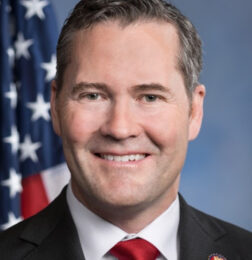
It’s critical to our national security that we come together to develop solutions to counter the Chinese Communist Party’s technological rise. I’m thrilled to serve alongside fellow lawmakers on the Global Tech Security Commission to ensure we deliver recommendations that can be applied by both our government and allies around the world to ensure democracies maintain a technological edge and safeguard freedom over authoritarian adversaries.
Rep. Michael Waltz (R-FL)
Honorary Co-Chair, Global Tech Security Commission
Featured Content
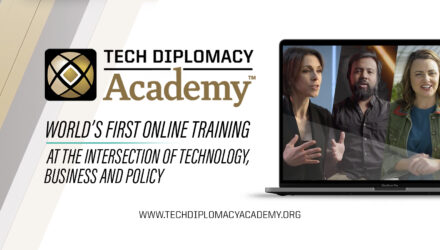
Today the Krach Institute for Tech Diplomacy at Purdue unveiled its Tech Diplomacy Academy, the world’s first and only online education platform poised to revolutionize how government, business, technology and citizen leaders are trained at scale about critical and emerging technologies, and how to compete and lead in a contested technology and geopolitical landscape.
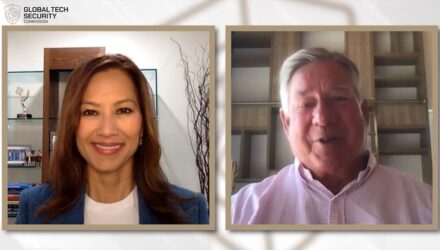
Roger Robinson, the Global Tech Security Commissioner for Capital Markets, talks with the Krach Institute for Tech Diplomacy about his role as the architect of the economic strategy deployed to take down the Soviet Union and how it is relevant today when confronting modern techno-authoritarian threats. The first of its kind, the position of Capital Markets Commissioner represents a shift in how leaders must think about competition with China. As Robinson points out, the United States dominates the world’s financial domain- it simply has not been leveraged.

